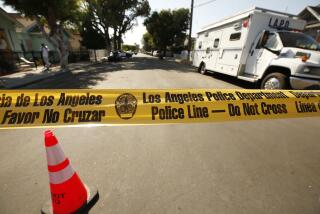Attorney Questions Police Credibility : Bomb Trial Evidence Called Weak
- Share via
A defense attorney told jurors Thursday that physical evidence linking a North Hollywood makeup artist to a bomb that killed two police explosives experts is “extremely, extremely weak” and that police witnesses lost credibility when their testimony differed on details.
Also, two prosecution witnesses whose testimony linked defendant Donald Lee Morse to the pipe bomb might have had ulterior motives for their statements, defense attorney Bernard J. Rosen said.
Morse, a 39-year-old television and film makeup artist, is charged with two counts of murder and two counts of possessing explosives in the officers’ deaths. Detective Arleigh McCree, 46, commander of the Los Angeles Police Department’s bomb squad, and Officer Ronald Ball, 43, were killed Feb. 8, 1986, when they tried to dismantle the bomb, one of two found in Morse’s garage.
Deliberations Monday
Jurors will begin deliberations Monday in the San Fernando Superior Court case. Judge John H. Major presided over the trial.
If convicted, Morse could be sentenced to life in prison without possibility of parole. He has been in Los Angeles County Jail without bail since the officers were killed.
Morse, who did not testify at his trial, told police at the time that he had never seen the bomb before and had allowed others to use his garage for storage.
Deputy Dist. Atty. Sterling E. Norris scoffed at Rosen’s contention that the bombs belonged to someone else, although he did not suggest why the defendant might have built the devices.
“It’s his house . . . his blasting powder, his fingerprints, his bomb manual,” the prosecutor told jurors. “He’s the bomber. He’s the man who made the bombs.”
Police experts testified in the trial that Morse’s fingerprints were on a bomb-making manual found in the house. They also said his fingerprints were on a coffee can discovered in the kitchen that contained blasting powder like that used in the bomb that McCree and Ball dismantled before attempting the second one, which exploded.
Shotgun Shells Found
Police also testified that in Morse’s bedroom they found shotgun shells similar to those in the dismantled bomb, although no shotgun was found at the house.
Carpet fibers found on the bomb also closely matched those taken from Morse’s house, experts said. Morse’s van, locked and parked near the garage, had two batteries similar to those used in the dismantled bomb, the prosecution said.
But Rosen contended that nine-volt batteries are commonplace. And all that could be concluded from prosecution testimony on carpet fibers is that those on the bomb “could have a common origin with those in the Morse house, or they might not,” he said.
Rosen also dismissed testimony by a former neighbor of Morse who quoted the defendant as saying in 1982 or 1983, “I know how to make a bomb,” and showing him a bomb-making manual.
The witness, Al Ward, “waited an incredible 10 months after the officers’ deaths before telling that story to police,” Rosen said. He suggested that Ward knew from news accounts the charges against Morse and “could merely have been basing his statement on that.”
Motives Questioned
Rosen also questioned the motives of William M. Enoch, Morse’s estranged brother-in-law, who testified that 10 days before the bomb blast Morse had threatened to blow him up with a bomb. Enoch might have been trying to curry favor with the police in the hope of enlisting their aid in his custody battle with his then-wife Ernestine, who had moved into the Morse house with the couple’s three children, Rosen said.
Norris characterized Enoch as “nothing more than a concerned father” who had nothing to gain from police in a civil dispute.
And he noted that the defense had suggested no reason Ward, a former friend of Morse, would invent such a story.
Rosen also concentrated on contradictory testimony by police officers about which shelf the bomb was found on, suggesting that the conflicts shook the officers’ credibility.
“What possible significance could that have?” Norris demanded in rebuttal, adding that witnesses frequently differ on details.
More to Read
Sign up for Essential California
The most important California stories and recommendations in your inbox every morning.
You may occasionally receive promotional content from the Los Angeles Times.













